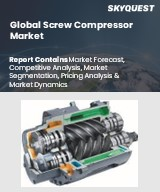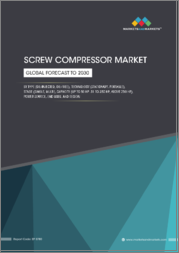
|
시장보고서
상품코드
1800843
스크류 컴프레서 시장 분석 : 유형별, 기술별, 단계별, 최종 이용 산업별, 지역별(2025-2033년)Screw Compressor Market Report by Type, Technology, Stage, End-Use Industry, and Region 2025-2033 |
||||||
세계 스크류 컴프레서 시장 규모는 2024년 112억 달러에 달했습니다. IMARC Group은 2033년에는 173억 달러에 달하고, 2025-2033년 연평균 성장률(CAGR)은 4.69%를 보일 것으로 전망하고 있습니다.
스크류 컴프레서는 스크류의 움직임을 이용하여 공기, 액체, 기체를 압축하는 기계장치를 말합니다. 일반적으로 잭 해머, 공압 펌프, 샌드 블라스팅 작업, 산업용 도장 시스템, 리벳 공구에 압축 공기를 공급하고 공급 압력의 변동을 최소화하여 압축 공기의 지속적인 공급을 보장하기 위해 일반적으로 사용됩니다. 이 장비는 주로 오목 볼록한 윤곽의 로터, 케이싱, 에어 필터, 고무 씰, 흡입 밸브, 토출 밸브로 구성됩니다. 기존 피스톤 압축기에 비해 스크류 컴프레서는 높은 공기압을 필요로 하지 않으며, 고출력 공구 및 중공업 용도에 사용할 수 있습니다.
세계의 급속한 산업화는 시장 성장을 가속하는 주요 요인 중 하나입니다. 화학, 석유화학, 금속, 광업, 자동차, 석유 및 가스 등 다양한 산업에서 스크류 컴프레서가 더 높은 효율로 최고 품질의 압축공기를 공급하기 때문에 제품 채택이 확대되고 있습니다. 또한, 천연가스 수요 증가도 시장 성장을 가속하고 있습니다. 스크류 컴프레서는 주로 가스 이송, 플레어 제거, 증기 회수 등에 사용되며, 극한의 기상 조건에서도 작동할 수 있어 유지보수를 최소화하고 전체 운영 비용을 절감할 수 있습니다. 에너지 효율이 높고 친환경적인 제품 개발 등 다양한 기술 혁신이 또 하나의 큰 성장 촉진요인으로 작용하고 있습니다. 기타 요인으로는 식음료 포장 분야에서의 제품 사용 증가, 광범위한 연구개발(R&D) 활동 등이 향후 몇 년 동안 시장을 주도할 것으로 예측됩니다.
본 보고서에서 답변을 얻을 수 있는 주요 질문
- 2024년 세계 스크류 컴프레서 시장 규모는?
- 세계 스크류 컴프레서 시장의 2025-2033년 예상 성장률은?
- 코로나19가 세계 스크류 컴프레서 시장에 미치는 영향은?
- 세계 스크류 컴프레서 시장을 이끄는 주요 요인은?
- 세계 스크류 컴프레서 시장의 기술별 분류는?
- 세계 스크류 컴프레서 시장의 주요 지역은?
- 세계 스크류 컴프레서 시장의 주요 기업은?
목차
제1장 서문
제2장 분석 범위 및 방법
- 분석 목적
- 이해관계자
- 데이터 소스
- 1차 정보
- 2차 정보
- 시장 추정
- 보텀업 접근
- 톱다운 접근
- 분석 방법
제3장 주요 요약
제4장 서론
제5장 세계의 스크류 컴프레서 시장
- 시장 개요
- 시장 실적
- COVID-19의 영향
- 시장 예측
제6장 시장 세분화 : 유형별
- 오일 인젝션 스크류 컴프레서
- 오일 프리 스크류 컴프레서
제7장 시장 세분화 : 기술별
- 고정형 스크류 컴프레서
- 휴대용 스크류 컴프레서
제8장 시장 세분화 : 단계별
- Single-Stage
- Multi-Stage
제9장 시장 세분화 : 최종 이용 산업별
- 석유 및 가스
- 화학제품 및 석유화학제품
- 식품 및 음료
- 자동차
- 발전소
- 광업 및 금속
- 기타
제10장 시장 세분화 : 지역별
- 북미
- 미국
- 캐나다
- 아시아태평양
- 중국
- 일본
- 인도
- 한국
- 호주
- 인도네시아
- 기타
- 유럽
- 독일
- 프랑스
- 영국
- 이탈리아
- 스페인
- 러시아
- 기타
- 라틴아메리카
- 브라질
- 멕시코
- 기타
- 중동 및 아프리카
제11장 SWOT 분석
제12장 밸류체인 분석
제13장 Porter의 Five Forces 분석
제14장 가격 지표
제15장 경쟁 구도
- 시장 구조
- 주요 기업
- 주요 기업 개요
- Atlas Copco
- Bauer Kompressoren
- Boge Kompressoren
- GE Oil & Gas
- Hitachi Ltd.
- Howden Group Ltd.
- Ingersoll Rand
- Kaeser Kompressoren SE
- Kobe Steel Ltd.
- Man SE
- Siemens AG
- Sullair LLC
The global screw compressor market size reached USD 11.2 Billion in 2024. Looking forward, IMARC Group expects the market to reach USD 17.3 Billion by 2033, exhibiting a growth rate (CAGR) of 4.69% during 2025-2033.
A screw compressor refers to a mechanical device that compresses air, liquids and gases using a screw-type motion. It is commonly used to provide compressed air to jackhammers, pneumatic pumps, sandblasting operations, industrial paint systems and riveting tools to ensure a continuous supply of compressed air with minimal fluctuations in the delivery pressure. The device majorly consists of concave and convex contour rotors, a casing, air filter, rubber seal, suction valve and delivery valve. In comparison to the traditionally used piston compressors, screw compressors can be used for high-power tools and heavy industrial applications without the requirement of high air pressure.
Rapid industrialization across the globe is one of the key factors driving the growth of the market. There is a widespread product adoption across various industries, including chemical, petrochemical, metal, mining, automotive and oil and gas, as screw compressors deliver premium-quality compressed air with higher efficiencies. Furthermore, the growing demand for natural gas is also providing a boost to the market growth. Screw compressors are largely used for transferring gas, flare elimination and vapor recovery and can also operate under extreme weather conditions, thereby requiring minimal maintenance and reducing the overall operational costs. Various technological innovations, such as the development of energy-efficient and environment-friendly product variants, are acting as another major growth-inducing factor. Other factors, including an increasing product utilization by the food and beverage packaging sector, along with extensive research and development (R&D) activities, are projected to drive the market in the coming years.
Key Market Segmentation:
Breakup by Type:
- Oil-Injected Screw Compressors
- Oil-Free Screw Compressors
Breakup by Technology:
- Stationary Screw Compressors
- Portable Screw Compressors
Breakup by Stage:
- Single-Stage Screw Compressors
- Multi-Stage Screw Compressors
Breakup by End-Use Industry:
- Oil and Gas
- Chemicals and Petrochemicals
- Food and Beverage
- Automotive
- Power Plants
- Mining and Metals
- Others
Breakup by Region:
- North America
- United States
- Canada
- Asia Pacific
- China
- Japan
- India
- South Korea
- Australia
- Indonesia
- Others
- Europe
- Germany
- France
- United Kingdom
- Italy
- Spain
- Russia
- Others
- Latin America
- Brazil
- Mexico
- Others
- Middle East and Africa
Competitive Landscape:
The competitive landscape of the industry has also been examined with some of the key players being Atlas Copco, Bauer Kompressoren, Boge Kompressoren, GE Oil & Gas, Hitachi Ltd., Howden Group Ltd., Ingersoll Rand, Kaeser Kompressoren SE, Kobe Steel Ltd., Man SE, Siemens AG, Sullair LLC, etc.
Key Questions Answered in This Report
- 1.What is the global screw compressor market growth?
- 2.What are the global screw compressor market drivers?
- 3.What are the key industry trends in the global screw compressor market?
- 4.What is the impact of COVID-19 on the global screw compressor market?
- 5.What is the global screw compressor market breakup by technology?
- 6.What are the major regions in the global screw compressor market?
- 7.Who are the key companies/players in the global screw compressor market?
Table of Contents
1 Preface
2 Scope and Methodology
- 2.1 Objectives of the Study
- 2.2 Stakeholders
- 2.3 Data Sources
- 2.3.1 Primary Sources
- 2.3.2 Secondary Sources
- 2.4 Market Estimation
- 2.4.1 Bottom-Up Approach
- 2.4.2 Top-Down Approach
- 2.5 Forecasting Methodology
3 Executive Summary
4 Introduction
- 4.1 Overview
- 4.2 Key Industry Trends
5 Global Screw Compressor Market
- 5.1 Market Overview
- 5.2 Market Performance
- 5.3 Impact of COVID-19
- 5.4 Market Forecast
6 Market Breakup by Type
- 6.1 Oil-Injected Screw Compressors
- 6.1.1 Market Trends
- 6.1.2 Market Forecast
- 6.2 Oil-Free Screw Compressors
- 6.2.1 Market Trends
- 6.2.2 Market Forecast
7 Market Breakup by Technology
- 7.1 Stationary Screw Compressors
- 7.1.1 Market Trends
- 7.1.2 Market Forecast
- 7.2 Portable Screw Compressors
- 7.2.1 Market Trends
- 7.2.2 Market Forecast
8 Market Breakup by Stage
- 8.1 Single-Stage Screw Compressors
- 8.1.1 Market Trends
- 8.1.2 Market Forecast
- 8.2 Multi-Stage Screw Compressors
- 8.2.1 Market Trends
- 8.2.2 Market Forecast
9 Market Breakup by End-Use Industry
- 9.1 Oil and Gas
- 9.1.1 Market Trends
- 9.1.2 Market Forecast
- 9.2 Chemicals and Petrochemicals
- 9.2.1 Market Trends
- 9.2.2 Market Forecast
- 9.3 Food and Beverage
- 9.3.1 Market Trends
- 9.3.2 Market Forecast
- 9.4 Automotive
- 9.4.1 Market Trends
- 9.4.2 Market Forecast
- 9.5 Power Plants
- 9.5.1 Market Trends
- 9.5.2 Market Forecast
- 9.6 Mining and Metals
- 9.6.1 Market Trends
- 9.6.2 Market Forecast
- 9.7 Others
- 9.7.1 Market Trends
- 9.7.2 Market Forecast
10 Market Breakup by Region
- 10.1 North America
- 10.1.1 United States
- 10.1.1.1 Market Trends
- 10.1.1.2 Market Forecast
- 10.1.2 Canada
- 10.1.2.1 Market Trends
- 10.1.2.2 Market Forecast
- 10.1.1 United States
- 10.2 Asia Pacific
- 10.2.1 China
- 10.2.1.1 Market Trends
- 10.2.1.2 Market Forecast
- 10.2.2 Japan
- 10.2.2.1 Market Trends
- 10.2.2.2 Market Forecast
- 10.2.3 India
- 10.2.3.1 Market Trends
- 10.2.3.2 Market Forecast
- 10.2.4 South Korea
- 10.2.4.1 Market Trends
- 10.2.4.2 Market Forecast
- 10.2.5 Australia
- 10.2.5.1 Market Trends
- 10.2.5.2 Market Forecast
- 10.2.6 Indonesia
- 10.2.6.1 Market Trends
- 10.2.6.2 Market Forecast
- 10.2.7 Others
- 10.2.7.1 Market Trends
- 10.2.7.2 Market Forecast
- 10.2.1 China
- 10.3 Europe
- 10.3.1 Germany
- 10.3.1.1 Market Trends
- 10.3.1.2 Market Forecast
- 10.3.2 France
- 10.3.2.1 Market Trends
- 10.3.2.2 Market Forecast
- 10.3.3 United Kingdom
- 10.3.3.1 Market Trends
- 10.3.3.2 Market Forecast
- 10.3.4 Italy
- 10.3.4.1 Market Trends
- 10.3.4.2 Market Forecast
- 10.3.5 Spain
- 10.3.5.1 Market Trends
- 10.3.5.2 Market Forecast
- 10.3.6 Russia
- 10.3.6.1 Market Trends
- 10.3.6.2 Market Forecast
- 10.3.7 Others
- 10.3.7.1 Market Trends
- 10.3.7.2 Market Forecast
- 10.3.1 Germany
- 10.4 Latin America
- 10.4.1 Brazil
- 10.4.1.1 Market Trends
- 10.4.1.2 Market Forecast
- 10.4.2 Mexico
- 10.4.2.1 Market Trends
- 10.4.2.2 Market Forecast
- 10.4.3 Others
- 10.4.3.1 Market Trends
- 10.4.3.2 Market Forecast
- 10.4.1 Brazil
- 10.5 Middle East and Africa
- 10.5.1 Market Trends
- 10.5.2 Market Breakup by Country
- 10.5.3 Market Forecast
11 SWOT Analysis
- 11.1 Overview
- 11.2 Strengths
- 11.3 Weaknesses
- 11.4 Opportunities
- 11.5 Threats
12 Value Chain Analysis
13 Porters Five Forces Analysis
- 13.1 Overview
- 13.2 Bargaining Power of Buyers
- 13.3 Bargaining Power of Suppliers
- 13.4 Degree of Competition
- 13.5 Threat of New Entrants
- 13.6 Threat of Substitutes
14 Price Indicators
15 Competitive Landscape
- 15.1 Market Structure
- 15.2 Key Players
- 15.3 Profiles of Key Players
- 15.3.1 Atlas Copco
- 15.3.1.1 Company Overview
- 15.3.1.2 Product Portfolio
- 15.3.1.3 Financials
- 15.3.2 Bauer Kompressoren
- 15.3.2.1 Company Overview
- 15.3.2.2 Product Portfolio
- 15.3.3 Boge Kompressoren
- 15.3.3.1 Company Overview
- 15.3.3.2 Product Portfolio
- 15.3.3.3 Financials
- 15.3.4 GE Oil & Gas
- 15.3.4.1 Company Overview
- 15.3.4.2 Product Portfolio
- 15.3.5 Hitachi Ltd.
- 15.3.5.1 Company Overview
- 15.3.5.2 Product Portfolio
- 15.3.5.3 Financials
- 15.3.5.4 SWOT Analysis
- 15.3.6 Howden Group Ltd.
- 15.3.6.1 Company Overview
- 15.3.6.2 Product Portfolio
- 15.3.6.3 Financials
- 15.3.7 Ingersoll Rand
- 15.3.7.1 Company Overview
- 15.3.7.2 Product Portfolio
- 15.3.8 Kaeser Kompressoren SE
- 15.3.8.1 Company Overview
- 15.3.8.2 Product Portfolio
- 15.3.8.3 Financials
- 15.3.9 Kobe Steel Ltd.
- 15.3.9.1 Company Overview
- 15.3.9.2 Product Portfolio
- 15.3.9.3 Financials
- 15.3.9.4 SWOT Analysis
- 15.3.10 Man SE
- 15.3.10.1 Company Overview
- 15.3.10.2 Product Portfolio
- 15.3.10.3 Financials
- 15.3.10.4 SWOT Analysis
- 15.3.11 Siemens AG
- 15.3.11.1 Company Overview
- 15.3.11.2 Product Portfolio
- 15.3.11.3 Financials
- 15.3.11.4 SWOT Analysis
- 15.3.12 Sullair LLC
- 15.3.12.1 Company Overview
- 15.3.12.2 Product Portfolio
- 15.3.1 Atlas Copco














